- Home
- Susan Howatch
Ultimate Prizes Page 19
Ultimate Prizes Read online
Page 19
“Ingrid doesn’t matter now Alex is dead.”
“Alex may be dead but I’m still alive, aren’t I, and sometimes I feel so angry and muddled when I look back over my marriage—”
“Carrie—”
“Sometimes I think: Oh, if only there was someone who’d listen while I pour out my heart—”
“There is. Me. After Neville’s gone we’ll have a long talk and a good cry and then with any luck we’ll both feel better. Now, darling, why don’t we go into the drawing-room and listen to that nice man who plays the records on the wireless? He’s always so soothing that he’s bound to cheer you up …”
They departed for the drawing-room. I drank another cup of coffee and toiled upstairs to pack my bag. When I returned to the hall Lyle was waiting.
“Say goodbye to Carrie,” she said, “and then I’ll come out to the car with you. There’s something I forgot to ask.”
I knew I should stay longer. I knew I ought to be listening while Carrie poured out her heart. But I knew too that at that moment I was too disabled to provide the help she needed. As we said goodbye all I could do was promise to pray for her.
“Dear Neville!” she said again, so pathetically grateful for this painfully conventional assurance that I realised she had not consciously intended a plea for my help earlier. “How can I ever thank you for all you’ve done?”
I was so crippled by guilt that I could barely stumble outside to my car. I even forgot that Lyle wanted to talk to me; before I glanced through the open front door and saw her waiting at the gate I had already wasted time searching for her.
“What’s this question you forgot to ask?” I said, unlocking the car and heaving my bag into the back seat.
“Who will you talk it over with? Or in other words, who’s your spiritual director?”
I stared at her. “Why do you want to know?”
“I’ve got this horrid feeling you may have the same spiritual director as my husband, and I simply couldn’t bear you telling Jon how I’ve behaved.”
“Jon who?”
“Jon Darrow of the Theological College.”
“Jon Darrow? That ecclesiastical buccaneer? Good heavens, nothing would induce me to confide in an Anglo-Catholic ex-monk who combines the arrogance of Napoleon with the showmanship of Houdini!”
“Thank God. If I ever thought Jon would find out about last night—”
“No one’s going to find out about last night.”
“But what about your spiritual director?”
“I don’t have a spiritual director. I’m a Protestant, not an Anglo-Catholic.”
“Charles isn’t an Anglo-Catholic either, but he believes very strongly in the importance of—”
“Well, naturally I’ve always had an older clergyman with whom I can discuss my work. At the beginning of my career my older clergyman was Bishop Hargreaves, after 1932 he was Alex, and nowadays he’s Bishop Ottershaw.”
“But don’t you find it rather inhibiting to discuss personal problems with your boss?”
“What personal problems?” I got into the driving-seat, slammed the door and wound down the window. “Goodbye—and good luck. I’d apologise except there’s nothing to apologise for as it never happened.”
“Quite.” She was gazing at me with an expression of wonder tinged with concern. “But I’m beginning to think that you’re the one who needs the good luck.”
“All I need is will-power and common sense,” I said abruptly, starting the engine. “God helps those who help themselves.” Then having delivered myself of this latest masterpiece of optimism, I drove off, still feeling like death, into the next stage of my crisis.
2
It was noon when I reached Starbridge but on entering the Close I turned not west towards my new home but east along the North Walk. At the far end stood St. Anne’s Gate, the entrance available only to pedestrians as they slipped in and out of the vast walled domain of the Cathedral. Parking the car I walked through the gateway, crossed the main road beyond the walls and entered the Crusader Hotel in pursuit of refreshment. I felt unable to face returning home and picking up the threads of my archidiaconal life until I had been fortified with another dose of caffeine.
Having given the order to the lounge waiter, I visited the cloakroom to sort out various symptoms of discomfort in my outraged intestines and dashed some cold water over my face before daring to look in the mirror. I looked very pale and very sober. Reassured that death’s door was receding I returned to the lounge and dumped myself in the nearest armchair.
Triumphing over my hangover meant that I was at last able to think, as Dido would have put it, instead of merely to think. I was no longer worried about Lyle; it was in her own best interests to keep quiet. But although I might succeed in ringing down the curtain with my usual masterly efficiency, I knew I had an absolute moral duty to establish why I had wound up in such an appalling mess.
It was no good merely telling myself my behaviour had resulted from the strain of the funeral and a surfeit of whisky. These factors, though not without significance in my journey over the brink of decency into lunacy, were mere irritants, exacerbating a situation which already existed. My sexual frustration was probably a more crucial factor than the strain and the drink; any man who returns from his honeymoon with his marriage unconsummated is bound to be in an unstable state. Nevertheless I felt I had to look past my sexual frustration too in order to perceive the complex problem beyond. Why, after all, had I returned from my honeymoon with an unconsummated marriage? Because I had married Dido, even though it had been patently obvious that she had profound psychological difficulties which included sexual frigidity. And why had I married her? It was no use now, at this stage of the game, to plead feebly that I was the victim of an amour fou. That explained nothing, and as a good Modernist I had to believe in a rational explanation.
Of course a psychologist would probably have jumped to the conclusion long since that I was a masochist, one of those unfortunate creatures who obtained sexual thrills from being maltreated by women. But the trouble with this theory was that it bore no relation to my private fantasies, which usually (since I was a good clergyman) I managed to suppress. In other words, I knew very well that if Dido and I were locked up naked together with a couple of unspeakable toys, it certainly wouldn’t be me who’d wind up chained to the bedpost and begging to be whipped. Every instinct told me that I was very far from being a masochist, but if I wasn’t a masochist, why on earth had I married Dido after all her appalling behaviour during our tortuous courtship? I ADORE YOU, I had declared in my recent telegram, and since I still wanted her I could only suppose this must be true, but if I wasn’t a masochist, how had this unlikely adoration managed to survive?
It was all very well to tell myself (romantically) that I was endowed with inexhaustible patience, outstanding tenacity and a truly phenomenal Christian charity; it was all very well to tell myself (cynically) that I had to adore her in order to save the marriage and rescue myself from ruin. But what in heaven’s name, I asked myself in all honesty, was really going on? Even if I pleaded that I had fallen victim to the thrill of a challenge and the euphoria of chasing a first-class prize, I would still have to ask myself why I, a born survivor, had wound up taking such a suicidal course of action.
I began to feel frightened by my ignorance, but fortunately I was diverted by the arrival of my coffee which resembled not the familiar dishwater but some pre-war nectar of the gods. Evidently the Crusader Hotel was still celebrating V-E Day. I looked hopefully for sugar-lumps of pre-war dimensions but was disappointed. Even the Crusader had its limitations. Nevertheless the coffee was perfect, and by the time I was halfway through my first cup my brain was ticking over much more briskly. I could see now that it was futile to waste time wondering how I could have got into such a mess. The only important matter to be resolved was how on earth I was going to get out of it. I was almost certain that Dido would eventually return to me, but the time had come t
o decide what I was going to do when she turned up once more on my doorstep.
Ignoring the fact that I adored Dido (whatever that might mean), I considered the problem with a scrupulously rational detachment. A divorce was out of the question for a successful clergyman who wanted to remain a success, but could I perhaps pursue Dido’s suggestion of an annulment? I could not. An annulment would quickly be transformed by the gutter-press into a society scandal, and no clergyman who featured in a News of the World scoop ever survived in any worthwhile professional sense no matter how innocent he might be. Besides, I hardly wanted the entire diocese twittering about the poor Archdeacon who was too weak to consummate his marriage. I shuddered convulsively. What a nightmare! But at least I now knew beyond all doubt that I had to make the marriage work—and if the marriage was going to have any hope of working, it somehow had to be consummated.
I forced myself to confront the hideous possibility of a continuing non-consummation. If—when—Dido returned to me, she would be coming back primarily to still the gossiping tongues and there was no guarantee she would be able to surmount her repulsion. Moreover—and now I was really peering into the bottom of the sexual snake-pit—even if she did eventually consent to let me attempt intercourse, I might find she was physically unable to complete the act because of her mental revulsion. I had heard of such cases; I had dipped into my Freud and my Jung and my Havelock Ellis. Obviously my most sensible course of action was to coax her to consult a psychiatrist, but how long would all the inevitable therapy take? And how much longer could I continue without sex in these exceptionally frustrating circumstances when it was quite obvious that my chastity belt was buckling at the seams? If I was in a mess now, what kind of a mess would I be in after six months or—God forbid—a year? Utter despair suddenly overwhelmed me. Unable to finish my coffee I leant forward, my elbows on my knees, and buried my face in my hands.
I was not alone in the lounge. Two old ladies were whispering away in the far corner and a red-faced individual who might have been a retired Army officer was tucked into a chair with The Times, but none of these people had taken any notice of me. I was wearing a clerical suit, not my archidiaconal uniform, so I was easy enough to ignore; laymen expect Starbridge to be littered with clergymen circling the Cathedral Close in the manner of planets orbiting the sun, so even when I made my gesture of despair, burying my face in my hands, I hardly thought any observer would rate my behaviour worthy of a second glance. But I was wrong. After a moment I became aware that someone had stepped between me and the sunlight, which was slanting through the nearest window, and when this unseen body failed to remove itself I realised in alarm that I was being watched.
Whipping aside my hands I saw to my horror that a very tall man was towering above me with an expression of concern on his face.
It was my diocesan bête noire, Jon Darrow.
3
I should perhaps be fair (always such a difficult exercise when describing a man one dislikes) and state at once that Darrow was in his own peculiar way a most successful clergyman. He had a distinguished record as a chaplain during the First War. He was still remembered at Starmouth Prison, where he had worked after leaving the Navy. Later he had pursued a remarkable career as an Anglo-Catholic monk in the Fordite Order, and in the 1930s he had acquired a reputation as an accomplished spiritual director. I was certainly prepared to concede that Darrow had his gifts, but the trouble was that some of these gifts of his were, to put it kindly, unconventional. He was supposed to be a psychic—or so everyone whispered, and he never bothered to deny the rumors. I had heard people exclaim naively: “Darrow foresaw Pearl Harbor!” as if that proved his paranormal powers beyond doubt. All I can say is that with my own ears I heard him prophesy confidently at a dinner-party that General Rommel would never take Tobruk. Tobruk fell a month later. So much for men who pose as psychics, and so much for Mr. Jonathan Darrow.
However although he dabbled on the fringes of the absurd, there was nothing absurd about his personality and it would have been the greatest mistake to write him off as a harmless eccentric. He was arrogant, obstinate, ruthless and troublesome. In 1940 he had bounded out of his monastic Order (it was even rumoured that his call to leave had been manifested in a dream which he had had the nerve to describe as a vision) and having tossed aside his monk’s habit he had bounced back into a clerical suit in order to pursue a new career in the Starbridge diocese. Unfortunately he chose to invade my archdeaconry, which soon showed signs of dissolving into chaos; he started to indulge in parlour-tricks which he insisted on performing in church. (He was going through a faith-healing phase, and as far as I could discover he did everything except tell fortunes.) Poor Dr. Ottershaw used to reach automatically for his indigestion tablets whenever Darrow’s name was mentioned—as it often was, by me, in our discussions of diocesan problems.
At last in 1942 Darrow showed signs of adjusting to the world he had so flamboyantly re-entered, and he was recruited, as I have already mentioned, to teach at the Theological College in the Cathedral Close. Of course he wound up running the place. The principal had a breakdown, the vice-principal dropped dead and Darrow elbowed his way past the surviving staff to grab the reins of power. The surviving staff even seemed pleased. The students—the ordinands, I should say, since they were all hoping to be ordained—were thrilled. One either loathed Darrow or one loved him, and a great many people were so dazzled by his devout Anglo-Catholicism and his powerful personality that they never noticed the buccaneering adventurer who lurked alongside the image of the formidable clergyman which Darrow so successfully projected. He was in his sixties but prided himself on his youthfulness. After leaving the cloister he had even been reckless enough to marry a woman twenty-eight years his junior and beget a son—but of course it would never have occurred to Darrow in his arrogance that marriage and procreation are hardly dignified activities for a clerical gentleman of advanced years.
As I now saw him towering above me in the lounge of the Crusader I wanted to emit a loud groan and run a mile in the opposite direction; I hardly felt capable of conducting a conversation, no matter how casual, with my bête noire when I was in such a debilitated state. At the same time I could not help but see the black humour embedded in the situation. Lyle had made it clear that the one man I should avoid while I was recovering from my folly was Jon Darrow, yet here he was, the famous spiritual director, vibrating with curiosity as he noted my uncharacteristically despairing posture and hovering at my elbow as if hungry for a confession. My immediate reaction was: Let him starve. I entirely disapprove of clergymen of the Church of England who call themselves “priests,” prefer to be addressed as “Father” and amuse themselves by playing God in the practice of auricular confession. It always makes me want to bawl: “No Popery!” at the top of my voice and behave in a manner quite unbecoming to an archdeacon.
“Oh, hullo,” I said to Darrow in my best polite voice. “Fancy seeing you.” Unfortunately my best polite voice failed to come up to standard. I succeeded only in combining a wooden courtesy with a complete lack of enthusiasm.
“Are you all right?”
“Absolutely fine, couldn’t be better. And you?”
“Splendid, thanks. Mind if I sit down?”
I did mind—intensely—but anxious to create an air of nonchalance, I said sociably: “Go ahead.” During this exchange of banalities I suddenly remembered Evelyn Underhill—or was it her mentor, Baron Friedrich Von Hügel?—writing that there was no need to search for a spiritual director because when the time was right a suitable director would always appear. By no remote stretch of the imagination would Darrow ever be the right spiritual director for me, but I began to wonder if this meeting, far from being a heavy-handed jest of God, was in fact an obscure divine lifeline. “God helps those who help themselves,” I had said to Lyle with a Yorkshire pig-headedness worthy of Uncle Willoughby, but the truth, as I had realised just before Darrow’s arrival, was that I had reached the stage where I appear
ed to be beyond self-help. I was now experiencing a strong desire to confide in some wise stranger who could view my problems with detachment and offer first-class advice, but how was I to find such a paragon? The answer was: through Darrow, whose extensive work as a spiritual director would almost certainly have brought him into touch with the wisest churchmen in England. I began to frame a careful question in my mind.
“J. H. Ryder of The Church Gazette is giving me lunch here,” Darrow was saying. “He wants information for an article about the post-war hurdles for theological education—how we intend to cope with the large new influx of ordinands and so on.”
“Oh yes?” I had to stifle yet another impulse to run a mile in the opposite direction. Ryder, a Cambridge graduate, was one of the most influential ecclesiastical journalists in the land. In addition to his regular centre-page articles in The Church Gazette, the newspaper which had a large circulation among moderate churchmen, he wrote free-lance pieces on theology for The Times, He was also, like so many journalists, an incurable gossip. The last thing I wanted was Jack Ryder speculating why the Archdeacon of Starbridge was looking like death and slumped over black coffee in the lounge of the Crusader Hotel.
“If Ryder’s about to arrive I’d better pull myself together!” I said, making what I could only regard as a brilliant move to explain the situation with casual good humour. “I’m sure I looked wrecked. Yesterday I buried my mentor, Bishop Jardine.”
“Ah, I see. I did think, in fact, that you looked somewhat distressed … Are you saying you actually conducted the service?”
“It was what he wanted.”
“How very harrowing—and it’s difficult too, isn’t it, when one loses one’s mentor. One feels quite alone, with no one to confide in.”
Tiresome old conjuror, prying away, throwing out unexpected statements which by sheer chance happened to be extraordinarily accurate. “Well, as a matter of fact,” I said, looking vaguely out of the window as if the subject were quite unimportant, “I was just pondering on that. I’m not in the market for a spiritual director, but if you could think of a wise old man I could chat to occasionally, perhaps you’d let me know.”

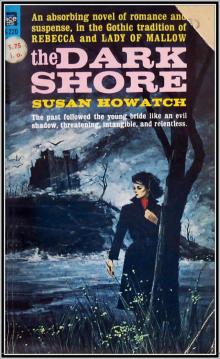 The Dark Shore
The Dark Shore Sins of the Fathers
Sins of the Fathers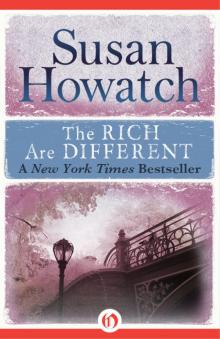 The Rich Are Different
The Rich Are Different The Shrouded Walls
The Shrouded Walls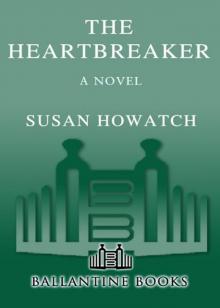 The Heartbreaker
The Heartbreaker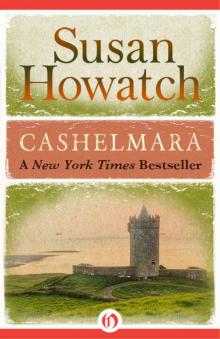 Cashelmara
Cashelmara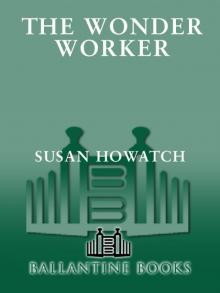 The Wonder Worker
The Wonder Worker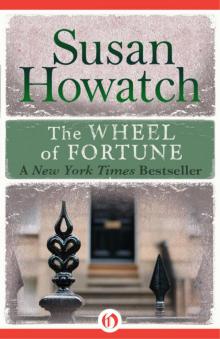 The Wheel of Fortune
The Wheel of Fortune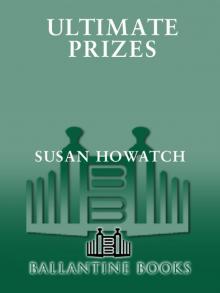 Ultimate Prizes
Ultimate Prizes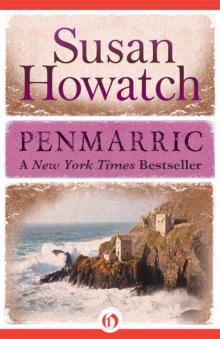 Penmarric
Penmarric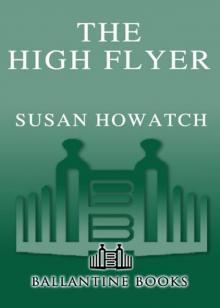 The High Flyer
The High Flyer